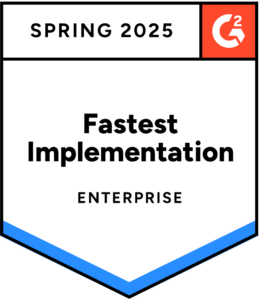Building the Business Case for Automating Financial Reconciliations: A Pathway to Efficiency and Growth
Blog post
Share
The pressure on financial institutions to innovate and streamline operations is immense and ever-growing. CEOs demand that financial teams not only enable growth but also cut costs and enhance efficiency. For CFOs and CIOs, achieving these goals often means teaming up to embark on a digital transformation journey. Automating financial reconciliations and the financial close process stands out as a pivotal strategy for CFOs when considering digital transformation. It all starts with realizing the substantial benefits of automation and building a compelling business case.
The Evolving Office of the CFO
The role of the CFO is evolving rapidly. Once primarily focused on traditional financial oversight, CFOs are now at the forefront of digital transformation. According to a recent study, “69% of business leaders say digitization initiatives are accelerating… These pressures meet at the CFO, who now faces a critical mandate: Lead the organization through a digital transformation.” To fulfill this mandate, CFOs must work closely with CIOs to align digital transformation strategies with organizational goals. Automation of financial reconciliations and the close process is a crucial component of this strategy.
The Challenge: Finance Teams in Survival Mode
Finance teams are often bogged down by outdated processes and technologies. Many teams find themselves operating at lower maturity levels, where over half self-identify as administrators or operators rather than catalysts for enterprise change. The blockers to efficiency include:
- Skilled Talent Stuck in Manual Processes: Highly skilled finance professionals are often bogged down by manual tasks that could be automated.
- Over-Reliance on Spreadsheets: Despite the availability of advanced tools, many finance teams still depend heavily on spreadsheets, which are prone to errors and inefficiencies.
- Legacy Tech Stacks: Outdated systems can create bottlenecks and limit the ability to integrate new technologies.
- Financial Control, Compliance, and Security: Ensuring compliance and security with manual processes is both challenging and risky.
- Shrinking Budgets: Limited financial resources can constrain the ability to invest in new technologies.
- Finance is Not the IT Department: Finance teams often lack the technical expertise required to implement and manage sophisticated digital solutions.
The Business Case for Automation: Start at the Close
Automating financial reconciliations and the financial close process offers several compelling benefits:
- Increased Compliance and Internal Controls: Automation ensures adherence to regulatory requirements and enhances internal controls by minimizing human error.
- Driving Efficiency and Reducing Costs: Automated processes are faster and more accurate, which translates into reduced operational costs and quicker closing cycles.
- Mitigating Risk: Automation reduces the risk of errors and fraud, ensuring more reliable financial data.
For financial institutions, these benefits are particularly pronounced due to their high transactional volumes (up to 20 billion transactions per year) and the need for stringent compliance with financial regulations. Automating reconciliations and close management not only improves accuracy but also enhances the ability to respond to regulatory changes swiftly.
Trintech’s Key Differentiators for Financial Institutions
When considering automation solutions, Trintech has financial institutions covered. With over 30 years of dedication to financial institution professional services under our belt, we’ve created purpose-built solutions with your specific needs in mind, including:
- Daily Reconciliations: Reconciling your most complex transactions—including federal reserve accounts, ATM settlements, and ACH clearing accounts—daily can help prevent work from piling up and creating bottlenecks.
- High Transactional Volume: The ability to handle large transaction volumes is essential for financial institutions.
- SWIFT Enabled: Integration with SWIFT networks facilitates seamless global transactions and compliance.
- Integration with ERP Solutions: Compatibility with existing ERP systems ensures smooth integration and data consistency.
- Automated Journal Entry and Close Management: Features that automate journal entries and close management can significantly streamline the financial close process.
Evaluating Your Business Case
To build a solid business case for automation, evaluate your organization’s needs and drivers against the benefits of adding a new solution:
- Need for Customizations: Determine if the automation solution requires extensive customization to fit your specific needs.
- Cost of Resources: Assess the costs associated with implementing and maintaining the automation solution.
- Budget: Evaluate the total cost of ownership against the expected ROI to ensure alignment with your budget constraints.
- Data Volume: Consider the volume of data your organization handles and ensure the solution can manage it effectively.
- Regulatory Constraints: Ensure the solution complies with industry regulations and can adapt to changes in regulatory requirements.
- Integration Requirements: Assess how well the solution integrates with existing systems and processes.
Trintech offers a wide variety of solutions that can be used stand-alone or as an integrated suite to seamlessly automate your financial close processes.
The Numbers Are In: Automation Saves Time
Automating financial reconciliations and the financial close process is not just a technological upgrade; it is a strategic move that can transform the efficiency and effectiveness of financial operations. For financial institutions, the benefits of automation are particularly significant, given the high volume of transactions and the need for stringent compliance. By addressing the challenges of manual processes and outdated systems, financial institutions can achieve a more efficient, compliant, and cost-effective operation. Building a robust business case for automation involves understanding your organization’s specific needs and aligning them with the benefits offered by automation solutions. As CFOs and CIOs work together to lead digital transformation, automation of financial processes will play a critical role in achieving organizational goals and driving growth.






